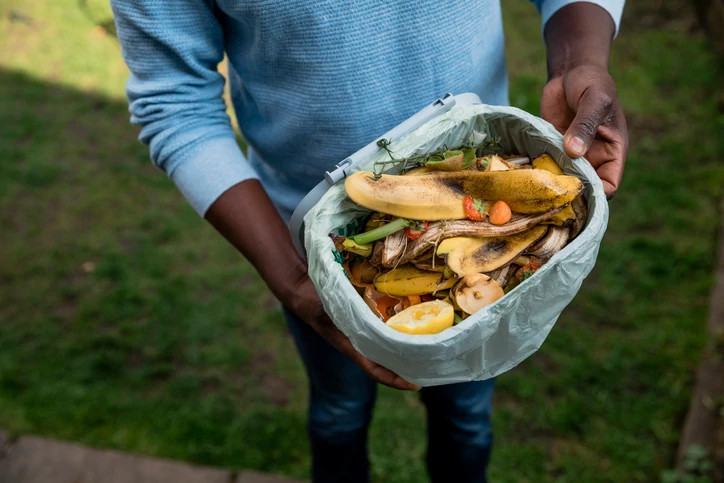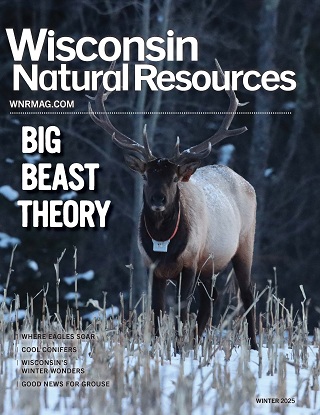Contact: Kate Strom Hiorns, DNR Recycling and Solid Waste Section Chief
kathrynm.stromhiorns@wisconsin.gov or 608-294-8663
Stop Food Waste Day April 27
Help Keep Food Waste Out Of Landfills
 We all can do a few easy things every day to reduce our food waste and its burden on our landfills.
Photo credit: iStock/SolStock
We all can do a few easy things every day to reduce our food waste and its burden on our landfills.
Photo credit: iStock/SolStock
MADISON, Wis. – Join the Wisconsin Department of Natural Resources (DNR) for Stop Food Waste Day on April 27 by helping keep food waste out of Wisconsin landfills.
Stop Food Waste Day is an international day of action in the fight against food waste. Food waste is edible food thrown away before it is eaten or because it is spoiled, as well as scraps such as banana peels and eggshells.
According to the DNR’s 2020-2021 Statewide Waste Characterization Study, food waste make up 20% of trash headed to our landfills, an amount that has more than doubled since the last study in 2009. Most of this food waste, 14.5%, could have been consumed.
Approximately 854,000 tons of food waste and scraps were sent to the state’s landfills in 2020 – that’s 294 pounds per Wisconsinite. Households contribute heavily to this amount, with food waste making up 30% of waste from residential sources.
“Wisconsin is one of several states where food waste dominates the waste stream, so momentum is building to address the issue,” says Brad Wolbert, DNR Waste and Materials Management Program Director. “Residents have a major opportunity to positively impact the environment while reducing resources and costs associated with food production, purchasing and disposal.”
Food waste in landfills doesn’t just take up valuable space. When organic waste breaks down in landfills, it emits significant amounts of methane, one of the main contributors to global warming. Landfills are required to collect and treat the gas, but it can be several years before a landfill cell is covered and those systems are in place. Meanwhile, the food waste continues to break down.
The DNR estimates that using or composting the amount of food waste sent to state landfills in 2020 would equal the amount of greenhouse gas emissions from taking nearly 600,000 passenger vehicles off the road for a year.
“The DNR’s Blueprint for Climate Action has set the goal of reducing food waste disposed of in Wisconsin landfills by half by 2030,” Wolbert said. “In addition to engaging residents, we look forward to building partnerships with communities, organizations and businesses.”
Make A Difference – Tips To Fight Food Waste
We all can do a few easy things every day to reduce our food waste and its burden on our landfills.
- Plan ahead. Before heading to the grocery store, take stock of what you have on hand, plan a few meals, make a list and stick to it. Don’t just wing it.
- Store leftovers safely. Handling your leftovers properly will help you avoid throwing them away. Cool them in shallow containers in the fridge to keep bacteria at bay, and if you’re freezing something, wrap it securely to prevent freezer burn and label it so you can identify it later.
- Make smart food substitutions. Avoid buying ingredients you’ll only use once in small amounts, and instead swap in substitutes. Use maple syrup instead of honey, cottage cheese instead of ricotta and make your own buttermilk by adding vinegar or lemon juice to milk.
- Know the fridge zones. Bust out your fridge’s user guide to learn about its zones or pay close attention to food when you store it in different areas of your fridge. Learn what areas work best for what types of food.
- Rescue foods nearing the end. Bananas getting brown? Peel and freeze them in sections, then use them for smoothies or banana bread. Sad-looking spinach? Sauté it for a few minutes, then add it to pizza, lasagna or pasta. Wilty kale? Stick it in a glass of water in the fridge to perk it up.
- Understand date labels. Except for infant formula, expiration dates are provided by the company for best quality. Food past a “best by” or “use by” date is not automatically unsafe.
For more resources, visit the DNR’s webpage on reducing residential food waste at home. When food waste is unavoidable, composting is an alternative to throwing food waste into the trash. For more information, check out the DNR’s Composting in Wisconsin webpage.

